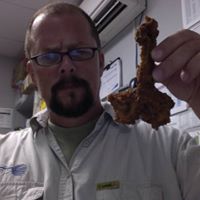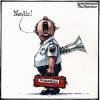Leaderboard
Popular Content
Showing content with the highest reputation on 01/22/2011 in all areas
-
Perhaps we've been going about this the wrong way. Many of us begrudge the IAFF (myself, for one) and bitch and moan all day long on EMS forums about how we don't want to become firefighters or engage in debates like this highlighting what we think are the shortcomings with fire based EMS. Perhaps we should be trying to learn from them--they're obviously doing something right, at least in the realm of politics. In order for EMS to become a strong, unified, individual body that stands on its own merits, we need to look at other organizations such as the American Nursing Association and the International Association of Fire Fighters and ask ourselves: how did they get to where they are? And why haven't our organizations such as the NAEMT been able to achieve a similar kind of success? I think that one of the major factors holding us back is a lack of motivation within the industry, which I think stems in large part from a severe lack of pride in our profession. Nurses and firefighters have been hailed for decades as national heroes, and idolized as champions of our society. In turn, people in both of these professions take tremendous pride in their work. I can't begin to explain the frequency with which I see nurses in scrubs and firefighters wearing their fire shirts while off duty, and they do so because they are very proud of what they do and also because we as a society hail them for being what they are. On the other hand, the general public has no idea who we are or what we are, and in turn I believe it leads to us becoming embittered and apathetic about our work. At least where I work, I can tell you the majority of EMTs and paramedics around here are more than content to "do their job and go home". We're not proud of what we are because nobody knows, nobody cares, and in turn the whole system becomes apathetic. Furthermore, because there are great deal of fire based EMS systems out there, there hasn't (to my knowledge) been any national or state EMS association willing to risk the wrath of the IAFF by taking a decided stance AGAINST fire based EMS. We're so afraid of inciting the ire of firefighters that we quietly remain the neutral party while organizations like the IAFF make blatant attacks against non-fire based EMS services. We're apathetic cowards, to put it delicately. We don't care and those of us who do support advancement in EMS are too scared to speak up against a form of EMS that we perceive to be, on the whole, detrimental to the advancement of our profession. We need to take a stance, if we want to survive in a non-fire based form. And I'm not out to pick a fight or to start making blanket statements about every fire based EMS service out there, but the IAFF has picked the fight to begin with and if it comes down to either fire based or non-fire based, I'm going to support a strong, unified and independent EMS. Neutrality from this point on is only a form of concession. We need a national organization that is going to take a stance on this, and we need EMTs and paramedics and services that are going to stand up and forcefully say nothing worse than what the IAFF is already saying: that our way is the best. The IAFF is desperate to save firefighter jobs, which is noble, but their desperation is apparent in their weak arguments in favor of fire based EMS and I believe that none of their points are indisputable or unbeatable. In order to become strong and independent, we have to use the same tactics that the ANA and the IAFF have used to become strong; that is take pride in our work and make our pride in our work known, become political (as opposed to remaining neutral) and take a stance on issues, be willing to fight for our way, and be willing to educate the public about who we are and why the way we do things is best (just like the IAFF is doing). If we continue to go along like we have been, independent, non-fire based EMS won't end with a bang, but disappear quietly into the night with barely a whimper.3 points
-
In the US; there are many titles the media and/or the laypublic calls EMS Providers. Its all fine. It is not a big deal. In the US, many don't want to see change in the education & curriculum. When echoes of having Associates Degree only Paramedic Programs with a Bachelor Degree option; most cringe. When proposals of hours added back to the EMT; many scream bloody murder. Its tough when some people in EMS, don't want to better themselves. When to some, added education and training is unnecessary. They find any excuse to resist it with far-fetched rationale. So how can we expect the layworld to know what to call us? I know I opened myself up for criticism but its mostly true.1 point
-
I strongly disagree. Nothing personal, but I am not two thirds of the way to finishing an Alberta EMT-P program (or ACP for the rest of Canada) so that I can be called an "Ambulance Driver." I don't even like being called an "EMT" because the majority of people are thinking of an advanced first aider when they use that title. I accept the EMT title for the time being because the Alberta public is at least beginning to understand the difference between ALS and BLS by using that title. Personally my favourite titles used were the old British Columbia titles. Emergency Medical Assistant (EMA) levels I, II, and III. Simple honest and direct. An EMA II could do more than an EMA I and an EMA III could do more than an EMA II. A developed Critical Care level could easily have been referred to as an EMA IV. Again. Simple, honest and direct without insulting the profession.1 point
-
Some of my back problems can probably also be related to the Ferno model 30 T-C. It was a good solid multi-level cot, but the problems were, and are, mostly the lifting in and out of the ambulances. As for borrowing a chair from the household, my suggestion is DO NOT DO IT!!! While I am too lazy to look it up, I do recall reading on this site (I think), of a patient that got injured when a crew, using a kitchen chair to move the patient down a flight of stairs, had the chair come apart on them, dumping the patient down the stairs, and causing bilateral peralysis below the waist to that patient. Home chairs were not designed for the strain of the front legs being pulled one way, while the chair back is being pulled the other, such as would be put on them in this type situation.1 point
-
1 point
-
As respectfully as I can put it: I'm not a firefighter. I don't want to be a firefighter. And I will never be a firefighter. And I won't fault a firefighter for saying the same with the omission of "firefighter" and the replacement of it with "paramedic". Some fire services do it great, a lot seem to not do it so well. I don't really see any relationship between fighting fires and medicine, which is perhaps why I've so rarely heard of a doctor or nurse who fights fires in their free time and why I suspect they're not the first ones to jump into action when a fire breaks out in the hospital. I contest that, as I think many others would as well. True, some medical conditions are time sensitive, but I think on the whole the vast majority of what we see is not time sensitive. Depends. Greatly. You know, until you take into account that even fire departments that provide EMS still have to staff separately for fire and EMS functions--which essentially means you're still paying for the same number of personnel if you exclude administration. And damn, here I had been doing nothing more than loading patients up and driving as fast as humanly possible to the hospital. If only I was a firefighter, then maybe I would have known to do interventions and stabilization first. (No offense to firefighters here, the implication was the IAFF's.) I'm not sure of the wisdom of trying to do anything more than extricate a patient that's inside a burning building. But I'm just a paramedic. Let me clarify something: I have no problem with firefighters. I love firefighters. The vast majority of firefighters that I have worked with have been professional, courteous, and respectable human beings. However, like I said, I don't want to be a firefighter, and I don't much care for propaganda that seeks to disparage my ability to provide the highest level of emergency medical care or that pushes to replace me or force me into a position to become something I don't want to be. If it works for your service, great. And if you're a firefighter, that's great too. I applaud you and thank you for everything you do. But organizations like the IAFF are only out to secure firefighter jobs in the wake of increasingly harder financial times for fire departments and they're going to say whatever they have to to do that, which I can understand, they're fighting for their survival, but all the same if their interests run counter to mine (which they do), you can bet I'm going to fight for my livelihood just as hard as they're fighting for theirs. And furthermore, I think (as you all can obviously see) that the majority of their pro-fire based EMS arguments are flimsy at best. Another point I should bring up is the question of how good of care can or will a firefighter who was forced to become a paramedic provide? And will the IAFF and fire departments advocate increased educational requirements including a minimum of an Associate's degree and more Bachelor's options? Something tells me no. I'll also add that I wouldn't be wholly against working in a fire based EMS system if they did it right; if they really focused on making their medicine top notch, and if I wasn't forced to function as or become a firefighter as a requirement for employment. I like my ambulance and the idea of running into burning buildings doesn't appeal all that much to me. Given those, I don't care if you call it "Generic County Fire Department" or "Generic County Emergency Medical Services" or even "Generic County Ambulance Thingamajig".1 point
-
You and I still disagree on this. I believe that you proved to belong in EMS more than just about anyone I've ever met. Doing what you did was right, the mistake you made was trusting that if you tried and then fell on your face that the others in the thread would pick you up and lead you around the puddle you fell in, and that just didn't happen. Had it come from someone else, or not been as filled with such enthusiasm then maybe I would feel differently, but I doubt it. Because of your questions I will be spending the spare time in my next few day review the physiology/pathophysiology surrounding your question. And that's what we're supposed to do, right? When did we decide that you have to know the answers before you ask a question? I'm still a little pissed, ok, a lot pissed by the attitude of, "Ummmm,,,,Yeah....You don't really belong here as you don't have the necessary education to understand it, nor will you likely ever use is, so...well....buh bye now..." Fuck that. I will be truly disappointed if you leave this experience believing that being brave and motivated enough to bite off more than you were prepared to chew somehow made you look like an asshole, or a whacker. If you choose to follow that line of reasoning then you must apply it to all that come after you. If it's right for you, it's right for them. Are you prepared to do that? Though we have a ton of great, smart, experienced providers now, we have lost a lot as well. When I was new the board was ruled by akflightmedic and Dustdevil, Rid and a bunch of others. Not that they had the only opinions, or always the right opinions, but they could pretty much be counted on to steer things back in the right direction is they went off into the ditch. There were times when I left discussions with them thinking, "You know what...fuck this. I don't know the right answer, I may never know the right answer, I'm not going to listen to this shit!" But I'd come back. Because they made sense. And many of the opinions that I hold dear now came from them then. And I came to understand that though I had the wacker mentality that being a hero was paramount, they were teaching me that knowledge is king, and all of my good deeds needed to follow intelligence and education. Also, that if I wasn't willing to stand up for my opinions, then they really weren't very important opinions at all.... I once pointed out a post to Babs where I was pretty hard on you, in fact was afraid that I may have scared you off, but you came right back to the thread, had rethought you stance, done some research and didn't slow down for a second! I said, "Hey babe! Will you look at this fucking kid!?! I just kicked his nuts up next to his tonsils and he didn't even skip a beat!! I think he gets it!" Of course "it" is my own personal vision how how the world should be...but it's the right vision, so screw the rest of you guys... It sounds that though I got all pissy about that thread that you've done what you always do, take the good from it, find a way to get stronger from it, and took off running without missing a beat...Keep taking your chances at bat, even if you don't think you can hit the ball. Because that's how we get better, stronger, braver, more competent, confident. Good on you brother. End of rant...(Well, almost. Will you PLEASE use your friggin' spell check??) Really, really end of rant. Dwayne1 point
-
Okay, here it is. (big breath) I gave Cardizem to this patient, and it was a big mistake. I was convinced, incorrectly it seems, that this was 1:1 a-flutter with an abbarency. I came to that conclusion based on the flutter waves that I thought I saw with the trial of adenosine. In addition, I did not believe I was looking at VT as the axis is leftward (VT should be extreme rightward), there is no precordial concordance (as seen in VT), the morphology looks asymmetrical and abbarant (not VT), the rate is awful high for VT, and the patient was somewhat young. I think, although I wasn't consciously recognizing it at the time, that the auto interpretation on the 12 lead pushed me towards this decision as well. I try not to let that happen but in retrospect, if I'm honest, I think it played a role. I started with 15 mg Cardizem, which did nothing. Next I transmitted the 12 lead to the ED and consulted with a physician. I recognized the rhythm was wide and that our standing order is Amiodorone for this scenario (if its not flutter), but I wanted to discuss with the physician- especially since the first Cardizem didn't work (I was hesitant to give a 2nd dose). I was ordered to follow up with another 10 mg of Cardizem (??). That didn't do anything either. In the ED they gave mag and amiodorone with no effect. Cardiology consult eventually decided to cardiovert, which worked immediately. The post cardioversion rhythm had delta waves, and a pattern (not an expert on this part at all) that the cardiologist identified as an orthodromic reentry mechanism/WPW. For those who are unfamiliar, giving Cardizem (calcium channel blocker) to patients with WPW is absolutely contraindicated and quite dangerous. The patient turned out to be fine, but the cardiologist said that I "really dodged a bullet," and "got really freaking lucky." Turns out I was right that there was an atrial origin, but dangerously wrong about the rest. I consider a big lesson learned for me. There is no reason I should have been messing around trying to identify an atrial origin/abbarency. Wide + fast should have just been amiodorone (or procanimide), and that should have been that. I stand by my decision not to cardiovert immediately, but I recognize that I made a pretty big error in my drug choice. Anyways, there it is. I've been a medic for 5 years now, I've done lots and lots of bad calls, but I'm still making mistakes and learning hard lessons every now and then. I thought I'd pass it on so hopefully people can give these things some thought before this happens to someone else! Thanks for playing!1 point





